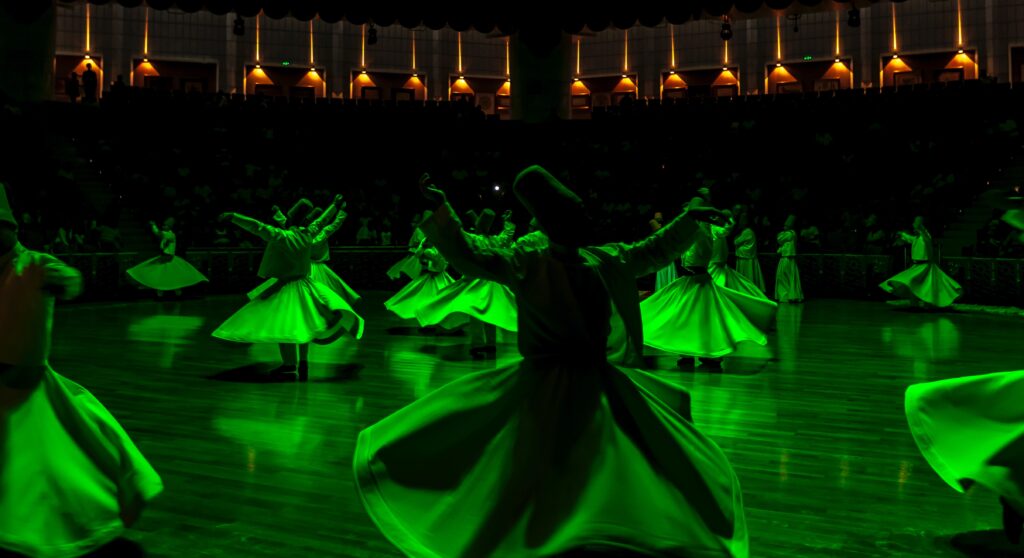دو شعر فارسی
از مولانا جلال الدین محمد بلخی (فارسی)، قرن ۱۳
باز آ هر آنچه هستی، باز آ
گر کافر و کبر و بت پرستی، باز آ
این درگه ی ما درگه ی نومیدی نیست
صد بار اگر توبه شکستی، باز آ
از کفر و ز اسلام برون صحرائیست
ما را به میان آن فضا سودائیست
عارف چو بدان رسید سر را بنهد
نه کفر و نه اسلام و نه آنجا جائیست
Two Persian Poems
Translated by Sweeta Yaqoobi
Come again, whatever you identify as, come again
Whether you are a nonbeliever, an infidel, or a worshipper
This door of ours is not of despair
Even if you break your vows a thousand times, come again
There is a field in which neither Islam fits nor infidelity
I have a thought that has been growing in its air
When a mystic arrives in it, he prostrates—
Neither infidelity, nor Islam, nor that place exist
[avatar user="syaqoobi" size="thumbnail" align="left" ]Sweeta Yaqoobi[/avatar]
[bg_collapse view="link" color="#4a4949" icon="arrow" expand_text="Translator's Note (English)" collapse_text="Hide" onclick="console.log('clicked');" ]
Growing up in Kabul, I would hear Rumi’s poems everywhere, in old men’s conversations in a corner shop, on the radio before the host started the show, in my mother’s sayings. It was as if Rumi’s poetry was in the atmosphere of the city. Rumi is commonly referred to as Maulana for Maulana Jalaluddin Mohammad Balkhi, his complete name. Balkh is a province in northern Afghanistan, loved by the rest of the country for giving birth to Maulana and many other such figures.
When I came to the U.S. a couple of years ago, I wasn’t surprised to learn of Rumi’s popularity among intellectuals, social media users, Pinterest boards of teenage girls decorated with “inspirational quotes” of Maulana in English. I soon found myself unpleased by the “inspirational quotes” version of the same poems that I had enjoyed reading and hearing growing up. Part of the reason the poems did not have the same effect on me, I assumed, had to do with the fact that I was now reading them in a third language. But another reason, I came to realize, was because the poems were heavily interpreted in the process of translation. I understand much gets lost in translation, and the translator sometimes must compromise on words to capture the essence of what is said in the original text.
I wanted to take a different approach translating these poems. My intension was to offer a word-by-word translation in order to give the reader the liberty of interpreting the work themselves. As a native Farsi speaker, my experience of reading Maulana’s poems while translated in this manner, is the closest to when I read the text in the original language. I wanted to offer the reader a glimpse into how the poems could be felt and experienced in the original form by a native speaker of the language.
[/bg_collapse]
[bg_collapse view="link" color="#4a4949" icon="arrow" expand_text="Translator's Note (فارسی)" collapse_text="Hide" onclick="console.log('clicked');" ]
من در کابل با شندین اشعار رومی بزرگ شدم. در گوشه کنار شهر، اشعار رومی بر سر زبان همه است، چه در سخنان ریش سفیدان، چه در آغاز یک برنامه ی رادیویی، و چه در گفته های مادرم. اشعار رومی گویا در فضای شهر پیچیده است.
رومی را همه به اسم مولانا می شناسند، خلاصه ی نام مکمل ایشان، مولانا جلال الدین محمد بلخی. بلخ، شهری در شمال افغانستان، برای به دنیا بخشیدن شاعران و سرشناسانی چون مولانا میان شهروندان این کشور معروف می باشد.
چند سال قبل که من به امریکا آمدم، معروفیت و محبوبیت مولانا در میان فرهنگیان، کاربران شبکه های اجتماعی، و نوجوانان که صفحات پینترست بورد شان با نقل قول های الهام بخش مولانا تزیین شده اند، باعث تعجب برایم نبود. چندی بعد اما متوجه شدم که خواندن اشعار مولانا به شکل نقل قول های الهام بخش با ترجمه ی انگلیسی آن برایم خوشایند نیست، خواندن و شنیدن همین اشعاری که من با لذت بردن از آنها بزرگ شده بودم. دلیلی که این اشعار باعث ایجاد تأثیر خاصی روی من نمیشدند، با خود حدس زدم، شاید این است که حالا من این اشعار را در زبان سوم ام میخوانم. اما دلیل دیگری هم این است که ترجمه ی انگلیسی این اشعار پر از تحلیل و تفسیر محتوای آنها می باشد. طبیعتأ معنی کلمات گاهی در هنگام ترجمه از بین می رود، و بعضأ مترجم مجبور به حذف بعضی از کلمات می شود تا بتواند محتوای اصلی متن را در زبان دیگری به دسترس قرار دهد.
من برای ترجمه ی این اشعار شیوه ی جدیدی را در نظر گرفتم. هدف من از ترجمه ی خط به خط این اشعار این بود که خواننده آزادی تحلیل و تفسیر آن را داشته باشد. برای من به حیث یک فارسی زبان، خواندن ترجمه ی اشعار مولانا به این شکل نزدیک ترین تجربه به خواندن آنها در زبان اصلی آن می باشد. منظور از این هدف ایجاد چنین تاثیر در خواننده ی ترجمه ی این اشعار است.
[/bg_collapse]

